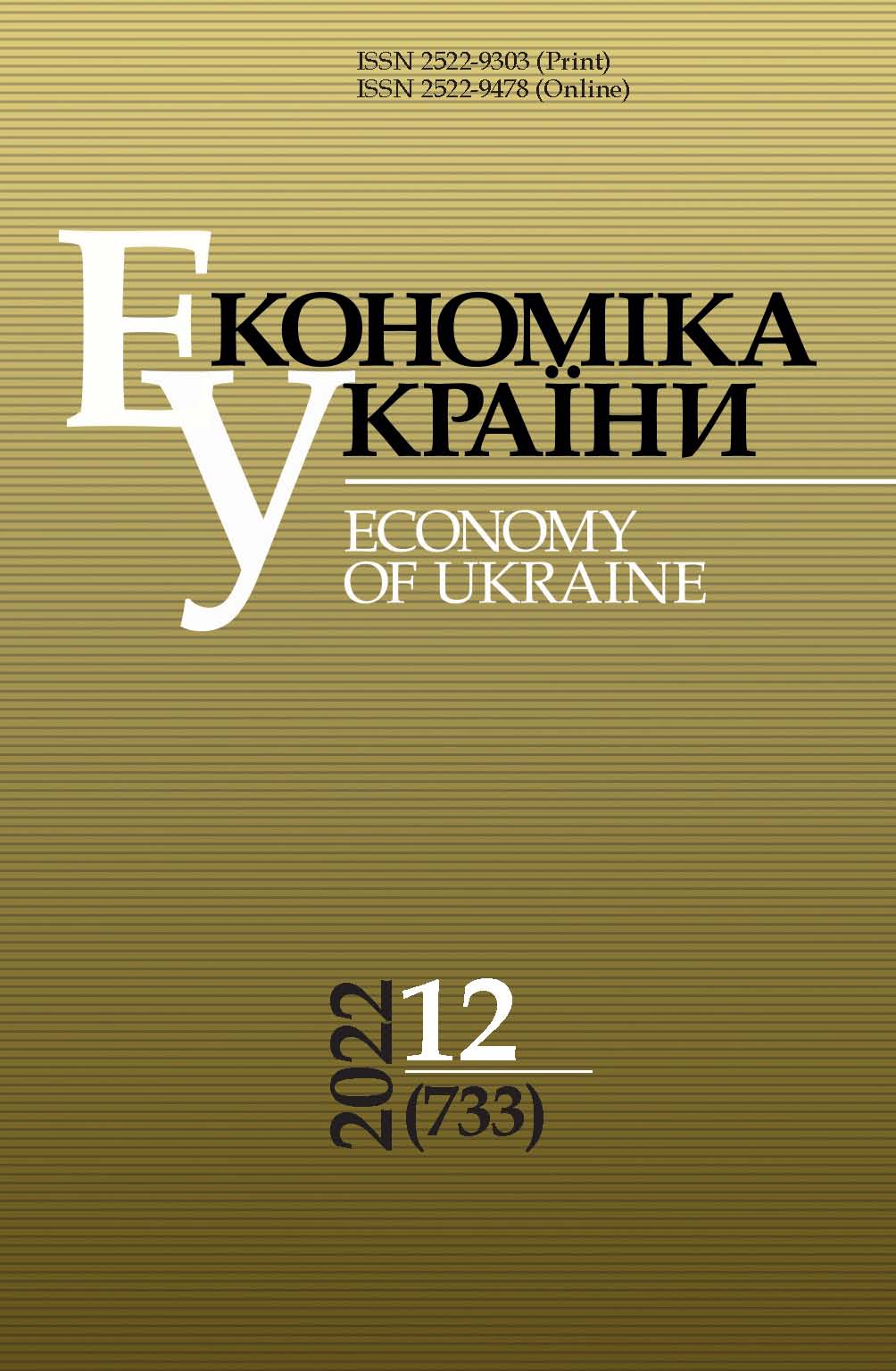ON GENERAL AND SPECIAL THEORIES OF VALUE
DOI:
https://doi.org/10.15407/economyukr.2022.12.013Keywords:
hypothesis; concept; theory; cost; value; hypothesis about universality and complexity of value; general theory of value; temporal space and structure of value relations; trialectics of the general, special and unique; co-evolution of activity and value; conceptual and fundamental theoretical model (scheme) of the general theory of valueAbstract
Classical and modern concepts and theories of cost and value are reviewed retrospectively. Emphasis is placed on synthetic and fundamental developments, the need to elaborate them in view of the advancing expansion of humanization sphere. A hypothesis about the universality and complexity of value relations is put forward. Their philosophical, general scientific and economic content is determined. Value relations (value) are presented as a complex system of subject-subject relations associated with the interrelated and economically significant for subjects correspondences: a) between the subjective image of a real object and the real object itself, inter alia, between different elements of the former, on the one hand, and different elements of the latter, on the other; b) between different elements of the subjective image of a real object; c) between different elements of a real object. This system is a core of fundamental theoretical model (scheme) of value. The utility and expenditure components of value, as well as the trialectics of its general, special and unique are characterized. The general component of value is characteristic of all eras and epochs in humanity development, special – of certain eras and areas of activity, and unique – of certain methods of production. The temporal space of the general theory of value has been developed in the coordinates of activity results, areas and attributes, dimensions, as well as historical boundaries of activity and value. The positioning of the theory of labor value in it is shown. The historical co-evolution of activity and value in the context of coexistence and change of eras and epochs in humanity development is considered. A conceptual and fundamental theoretical scheme for the general theory of value is proposed. The cores of special theories of value acquire the status of particular theoretical schemes for the general theory of value. A conclusion was made about the need to catalyze scientific search for those new special theories of value that are able to adequately describe and explain value relations in humanization (mediated, direct and humanization in general), inter alia, in the creation of knowledge and knowledge-information products.
References
Tarasevych V. Theoretical dimension of information-digital economy: foundations and system of primary information phenomena. Economy of Ukraine, 2021, No. 1, pp. 3-23 [in |Ukrainian].
doi.org/10.15407/economyukr.2021.01.003
Tarasevych V. Theoretical dimension of the information-digital economy: information activity and the system of the derived information phenomena (products). Economy of Ukraine, 2021, No. 3, pp. 3-18 [in Ukrainian].
doi.org/10.15407/economyukr.2021.03.003
Tarasevych V. Theoretical dimension of information-digital economy: information-digital processes and their attributes. Economy of Ukraine, 2021, No. 6, pp. 21-35 [in Ukrainian].
doi.org/10.15407/economyukr.2021.06.021
Tarasevych V. Modern co-revolution: activity content and dialectics of informative and cognitive systems. Economy of Ukraine, 2021, No. 10, pp. 3-18 [in Ukrainian].
doi.org/10.15407/economyukr.2021.10.003
Tarasevych V. Modern co-revolution: a mechanized man and/or a humanized machine. Economy of Ukraine, 2022, No. 2, pp. 20-36 [in Ukrainian].
doi.org/10.15407/economyukr.2022.02.020
Marx K., Engels F. Works. Vol. 23. Moscow, 1960 [in Russian].
Buzgalin A.V., Kolganov A.I. The Limits of Capital: Methodology and Ontology. Reactualization of classical philosophy and political economy (selected texts). M., 2009 [in Russian].
Valtukh K.K. Information theory of value and laws of non-equilibrium economics. M., 2001 [in Russian].
Buzgalin A., Kolganov A. Political Economy of Post-Soviet Marxism (Theses to Forming of Scientific School). Voprosy Ekonomiki, 2005, No. 9, pp. 36-55 [in Russian].
doi.org/10.32609/0042-8736-2005-9-36-55
Grytsenko A.A. Development of forms of exchange, value and money. Kyiv, 2005 [in Russian].
Bodrikov M. Labor Theory of Value: Problems and Historical Significance. Voprosy Ekonomiki, 2008, No. 4, pp. 110-129 [in Russian].
doi.org/10.32609/0042-8736-2008-4-110-129
Tronev K. K. Marx's doctrine of value, its substance and form. Economic Sciences, 1999, No. 7 [in Russian].
Tronev K. Categories of market value and market price in the 3rd volume of "Capital" by K. Marx (materials for lectures and seminars). Russian Economic Journal, 2004, No. 1 [in Russian].
Bodrikov M. Classical Theory of Value: Modern Sense of Unsolved Problems. Voprosy Ekonomiki, 2009, No. 7, pp. 97-118 [in Russian].
doi.org/10.32609/0042-8736-2009-7-97-118
Inozemtsev V.L. The concept of post-economic society: theoretical and practical aspects. Dr. Sci. (Econ.) Diss. M., 1998 [in Russian].
Artemova T.I. Cost and price: the logical and historical process of shaping. Kyiv, 2006 [in Russian].
Afanasyev V. The contribution of the Austrian school to the development of the labor theory of value. Voprosy Ekonomiki, 2002, No. 2, pp. 102-117 [in Russian].
Tarasevich V.N. Ecunics: Hypotheses and Experiments. M., 2008 [in Russian].
Chekhovsky V. On the Translation of Marx's "Wert" in Russian. Voprosy Ekonomiki, 2008, No. 2, pp. 154-157 [in Russian].
doi.org/10.32609/0042-8736-2008-1-154-157
Tarasevich V.N. Fundamental Economics: Universality of Content and Development. Dnipro, 2017 [in Russian].
Soboleva I. Measuring Human Capital: Paradoxes and Contradictions. Voprosy Ekonomiki, 2009, No. 9, pp. 51-69 [in Russian].
doi.org/10.32609/0042-8736-2009-9-51-70
Downloads
Published
How to Cite
Issue
Section
License
Copyright (c) 2022 Institute for Economics and Forecasting of the NAS of Ukraine

This work is licensed under a Creative Commons Attribution-NonCommercial-NoDerivatives 4.0 International License.



